新六下英语单词句子表
- 格式:docx
- 大小:71.27 KB
- 文档页数:2
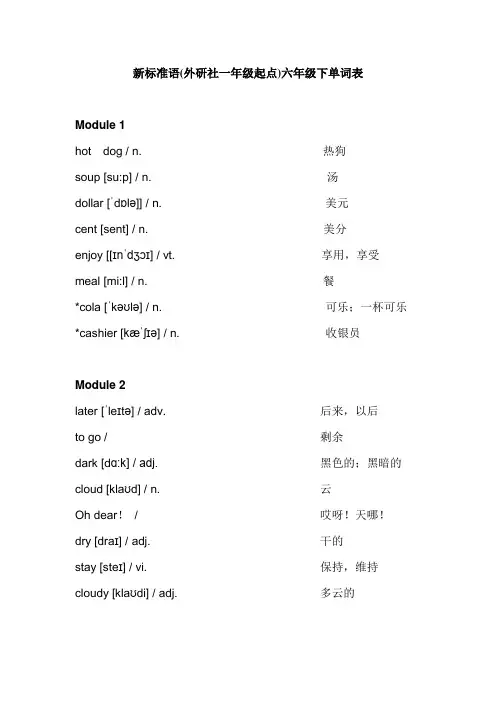
新标准语(外研社一年级起点)六年级下单词表Module 1hot dog / n. 热狗soup [su:p] / n. 汤dollar [ˈdɒlə]] / n. 美元cent [sent] / n. 美分enjoy [[ɪnˈdʒɔɪ] / vt. 享用,享受meal [mi:l] / n. 餐*cola [ˈkəʊlə] / n. 可乐;一杯可乐*cashier [kæˈʃɪə] / n. 收银员Module 2later [ˈleɪtə] / adv. 后来,以后to go / 剩余dark [dɑ:k] / adj.黑色的;黑暗的cloud [klaʊd] / n. 云Oh dear!/ 哎呀!天哪!dry [draɪ] / adj. 干的stay [steɪ] / vi. 保持,维持cloudy [klaʊdi] / adj. 多云的Module 3close [kləʊz] / vi. 合上,关闭quickly [ˈkwɪkli] / adv. 快地,快速地left [left] / v.(leave的过去式)丢下cry [kraɪ] / vt.&vi. 喊,叫shine [ʃaɪn] / vi. (太阳)发光,照耀Module 4thing [θɪŋ] / n. 东西,事物need [ni:d] / vt. 需要grab [ɡræb] v.抓住,抓取balloon [bəˈluːn] n. 气球fly away 飞走Module 5bell [bel] / n. 门铃ring [rɪŋ] / vi. 响telephone [[ˈtelɪfəʊn] / n. 电话arrive [əˈraɪv] / vi. 到达hardly [hɑ:dli] / adv.几乎不*bark [bɑ:k] / vi.(狗)吠,叫*raincoat [ˈreɪnkəʊt] / n. 雨衣*tunnel [ˈtʌnl] / n. 隧道Module 6home [[həʊm] / vi. 回家earth [ɜːθ] / n. 地球space [speɪs] / n. 太空travel ˈtrævl] / vi. 旅行interested [ˈɪntrəstɪd] / adj. 感兴趣的be interested in 对……感兴趣surprised [səˈpraɪzd] / n. 惊奇的;惊讶的made [meɪd] / v.(make的过去式)做,制作model [ˈmɒdl] / n. 模型;模范;榜样national ˈnæʃnəl] / adj. 国家的flag [[flæɡ] / n. 旗*spaceship [ˈspeɪsʃɪp / n. 宇宙飞船*taikonaut [taikəʊnɔ:t] / n. (中国的)太空人,宇航员*seed [si:d] / n.种子Module 7flew [flu:] / v.(fly的过去式)飞,飞行spent [spent] / v.(spend的过去式)度过video [vɪdɪəʊ] / n. 录像born [bɔːn] / vt. 出生,诞生illness [ˈɪlnəs] / n. 病,疾病round [raʊnd] / prep. 在……各处all over the world / 全世界*someday [ˈsʌmˌdeɪ] / adv. 有朝一日Module 8classmate [klɑ:smet] / n.同班同学cup [kʌp] / n. 杯子baseball [ˈbeɪsbɔːl] / n. 棒球brought [br ɔːt] / v.(bring的过去式)带来more [mɔː] / adv. 更强烈地mistake [mɪsteɪk] / n. 错误make mistake / 犯错误word [wɜːd] / n. 单词,字Module 9wish [wɪʃ] / vi. 愿望,希望;祝,祝愿luck [lʌk] / n. 运气primary [ˈpraɪməri] / adj. 初级的,初等的;小学的primary school / 小学keep [ki:p] / vt. 保留future [fju: tʃə] / n. 未来,将来taught [tɔːt] / v.(teach的过去式)教,讲授wonderful [ˈwʌndəfl] / adj. 极好的,了不起的happiness [ˈhæpinəs] / n. 幸福,快乐best wishes / 最美好的祝愿*forever [fərˈevə] / adv. 永远*joy [dʒɔɪ] / n. 乐趣Module 10middle [mɪdl] / adj. 中部的;中等的;中间middle school / 中学speech [spi: tʃ] / n. 演说;讲演September [sepˈtembə] / n. 九月excited [ɪkˈsaɪtɪd] / adj. 激动的,兴奋的geography [dʒiˈɒɡrəfi / n. 地理same [seɪm] / adj. 相同的at the same time / 同时little [ˈlɪtl] / adj. 极少量的keep on / 保持each other / 互相;彼此chemistry [kemɪstrɪ] / n. 化学physics [fɪzɪks] / n. 物理*sometime [ˈsʌmtaɪm] / adv. 某个时候。
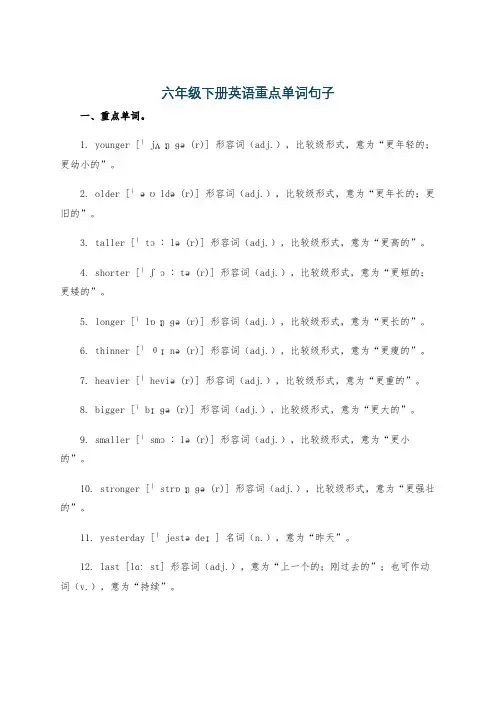
六年级下册英语重点单词句子一、重点单词。
1. younger [ˈjʌŋɡə(r)] 形容词(adj.),比较级形式,意为“更年轻的;更幼小的”。
2. older [ˈəʊldə(r)] 形容词(adj.),比较级形式,意为“更年长的;更旧的”。
3. taller [ˈtɔːlə(r)] 形容词(adj.),比较级形式,意为“更高的”。
4. shorter [ˈʃɔːtə(r)] 形容词(adj.),比较级形式,意为“更短的;更矮的”。
5. longer [ˈlɒŋɡə(r)] 形容词(adj.),比较级形式,意为“更长的”。
6. thinner [ˈθɪnə(r)] 形容词(adj.),比较级形式,意为“更瘦的”。
7. heavier [ˈheviə(r)] 形容词(adj.),比较级形式,意为“更重的”。
8. bigger [ˈbɪɡə(r)] 形容词(adj.),比较级形式,意为“更大的”。
9. smaller [ˈsmɔːlə(r)] 形容词(adj.),比较级形式,意为“更小的”。
10. stronger [ˈstrɒŋɡə(r)] 形容词(adj.),比较级形式,意为“更强壮的”。
11. yesterday [ˈjestədeɪ] 名词(n.),意为“昨天”。
12. last [lɑːst] 形容词(adj.),意为“上一个的;刚过去的”;也可作动词(v.),意为“持续”。
13. before [bɪˈfɔː(r)] 介词(prep.)/副词(adv.),意为“在……之前”。
14. hotel [həʊˈtel] 名词(n.),意为“旅馆”。
15. fixed [fɪkst] 动词(v.),fix的过去式,意为“修理;固定”。
16. broken [ˈbrəʊkən] 形容词(adj.),意为“破损的;弄坏了的”。
17. lamp [læmp] 名词(n.),意为“台灯”。
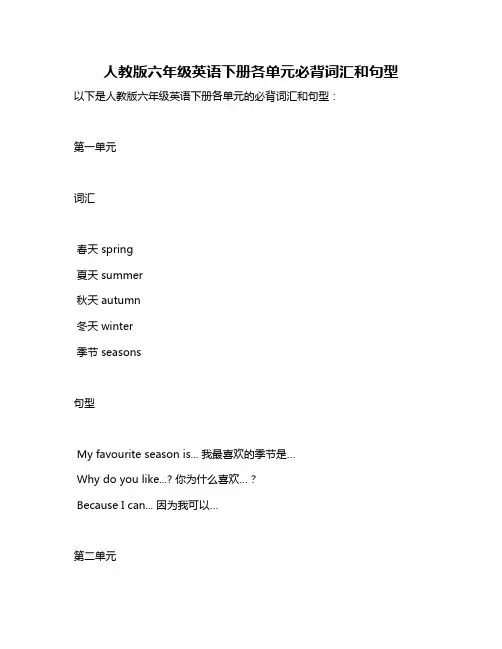
人教版六年级英语下册各单元必背词汇和句型以下是人教版六年级英语下册各单元的必背词汇和句型:第一单元词汇春天 spring夏天 summer秋天 autumn冬天 winter季节 seasons句型My favourite season is... 我最喜欢的季节是…Why do you like...? 你为什么喜欢…?Because I can... 因为我可以…第二单元词汇游泳 swim滑冰 skate放风筝 fly a kite堆雪人 make a snowman季节活动 seasonal activities句型What do you do in the...? 你在…做什么?I usually... 我通常…Do you often...? 你经常…吗?Yes, I do. / No, I don’t. 是的,我经常。
/ 不,我不经常。
第三单元词汇星期一 Monday星期二 Tuesday星期三 Wednesday星期四 Thursday星期五 Friday星期六 Saturday星期日 Sunday星期 weekdays星期天 weekends句型What do you have on...? 你星期几有什么课?I have... 我星期几有…课。
When do you have...? 你什么时候有…课? I have... on... 我在星期几有…课。
第四单元词汇电影 movies公园 parks图书馆 libraries博物馆 museums商店 shops饭店 restaurants医院 hospitals学校 schools银行 banks邮局 post offices公共场所 public places 句型。
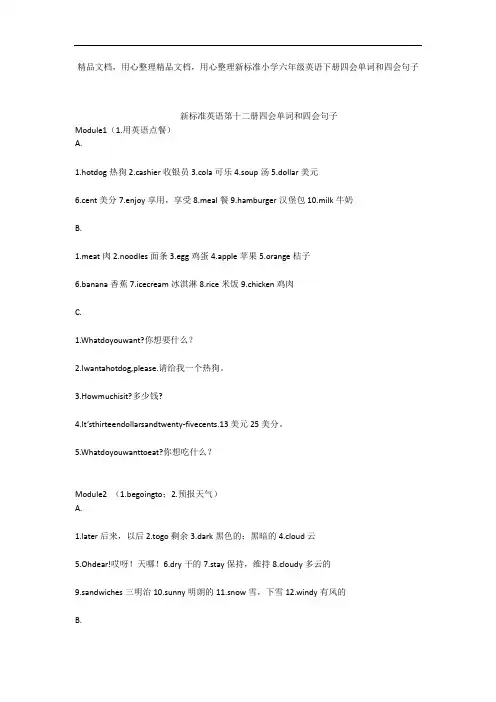
精品文档,用心整理精品文档,用心整理新标准小学六年级英语下册四会单词和四会句子新标准英语第十二册四会单词和四会句子Module1(1.用英语点餐)A.1.hotdog热狗2.cashier收银员3.cola可乐4.soup汤5.dollar美元6.cent美分7.enjoy享用,享受8.meal餐9.hamburger汉堡包k牛奶B.1.meat肉2.noodles面条3.egg鸡蛋4.apple苹果5.orange桔子6.banana香蕉7.icecream冰淇淋8.rice米饭9.chicken鸡肉C.1.Whatdoyouwant?你想要什么?2.Iwantahotdog,please.请给我一个热狗。
3.Howmuchisit?多少钱?4.It’sthirteendollarsandtwenty-fivecents.13美元25美分。
5.Whatdoyouwanttoeat?你想吃什么?Module2 (1.begoingto;2.预报天气)A.ter后来,以后2.togo剩余3.dark黑色的;黑暗的4.cloud云5.Ohdear!哎呀!天哪!6.dry干的7.stay保持,维持8.cloudy多云的9.sandwiches三明治10.sunny明朗的11.snow雪,下雪12.windy有风的B.1.haveapicnic野餐2.hungry饿的3.havebreakfast吃早餐4.havelunch吃午餐5.hot热C.1.I’mhungry.Whenarewegoingtoeat,Mum?我饿了。
我们将要什么时候吃饭,妈妈?2.Athalfpasttwelve.在12点半。
3.Lookattheducks!看那些鸭子!4.Whataretheydoing?它们在做什么?5.They’reeatingoursandwiches!它们在吃我们的三明治!6.It’sgoingtorainsoon.很快就要下雨了。
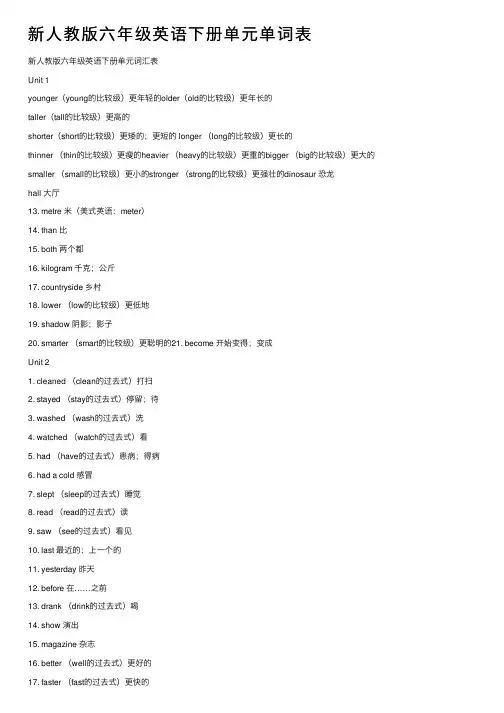
新⼈教版六年级英语下册单元单词表新⼈教版六年级英语下册单元词汇表Unit 1younger(young的⽐较级)更年轻的older(old的⽐较级)更年长的taller(tall的⽐较级)更⾼的shorter(short的⽐较级)更矮的;更短的 longer (long的⽐较级)更长的thinner (thin的⽐较级)更瘦的heavier (heavy的⽐较级)更重的bigger (big的⽐较级)更⼤的smaller (small的⽐较级)更⼩的stronger (strong的⽐较级)更强壮的dinosaur 恐龙hall ⼤厅13. metre ⽶(美式英语:meter)14. than ⽐15. both 两个都16. kilogram 千克;公⽄17. countryside 乡村18. lower (low的⽐较级)更低地19. shadow 阴影;影⼦20. smarter (smart的⽐较级)更聪明的21. become 开始变得;变成Unit 21. cleaned (clean的过去式)打扫2. stayed (stay的过去式)停留;待3. washed (wash的过去式)洗4. watched (watch的过去式)看5. had (have的过去式)患病;得病6. had a cold 感冒7. slept (sleep的过去式)睡觉8. read (read的过去式)读9. saw (see的过去式)看见10. last 最近的;上⼀个的11. yesterday 昨天12. before 在……之前13. drank (drink的过去式)喝14. show 演出15. magazine 杂志16. better (well的过去式)更好的17. faster (fast的过去式)更快的19. fixed (fix的过去式)修理20. broken 破损的21. lamp 台灯22. loud 喧闹的;⼤声的23. enjoy 享受……乐趣;喜爱24. stay 暂住;逗留Unit 31. went (go的过去式)去2. camp 野营3. went camping (尤指在假⽇)野营4. fish 钓鱼;捕鱼5. went fishing 去钓鱼6. rode (ride的过去式)骑(马;⾃⾏车)7. hurt (hurt的过去式)(使)受伤8. ate (eat的过去式)吃9. took (take)的过去式)拍照10. took pictures 照相11. bought (buy的过去式)买12. gift 礼物13. fell (fall的过去式)摔倒14. off 从(某处)落下15. Labour Day 劳动节16. mule 骡⼦17. Turpan 吐鲁番18. could (can的过去式)能19. till 直到20. beach 海滩;沙滩21. basket 篮;筐22. part ⾓⾊23. licked (lick的过去式)舔24. laughed (laugh的过去式)笑Unit 41. dining hall 饭厅2. grass 草坪4. ago 以前5. cycling 骑⾃⾏车运动(或活动)6. go cycling 去骑⾃⾏车7. ice-skate 滑冰8. badminton ⽻⽑球运动9. start 星10. easy 容易的11. look up (在词典中或通过电脑)查阅12. Internet 互联⽹13. different 不同的14. active 积极的;活跃的15. race 赛跑16. nothing 没有什么17. thought (think的过去式)想18. felt (feel的过去式)感觉19. cheetah 猎豹20. trip 绊倒21. woke (wake的过去式)醒22. dream 梦。
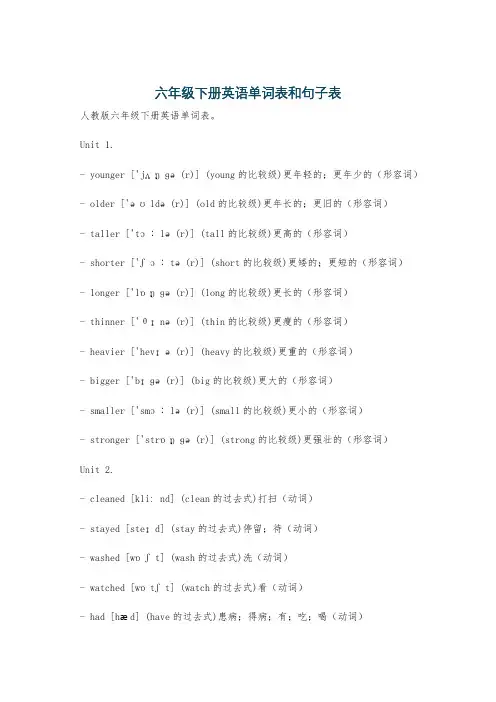
六年级下册英语单词表和句子表人教版六年级下册英语单词表。
Unit 1.- younger ['jʌŋɡə(r)] (young的比较级)更年轻的;更年少的(形容词)- older ['əʊldə(r)] (old的比较级)更年长的;更旧的(形容词)- taller ['tɔːlə(r)] (tall的比较级)更高的(形容词)- shorter ['ʃɔːtə(r)] (short的比较级)更矮的;更短的(形容词)- longer ['lɒŋɡə(r)] (long的比较级)更长的(形容词)- thinner ['θɪnə(r)] (thin的比较级)更瘦的(形容词)- heavier ['hevɪə(r)] (heavy的比较级)更重的(形容词)- bigger ['bɪɡə(r)] (big的比较级)更大的(形容词)- smaller ['smɔːlə(r)] (small的比较级)更小的(形容词)- stronger ['strɒŋɡə(r)] (strong的比较级)更强壮的(形容词)Unit 2.- cleaned [kliːnd] (clean的过去式)打扫(动词)- stayed [steɪd] (stay的过去式)停留;待(动词)- washed [wɒʃt] (wash的过去式)洗(动词)- watched [wɒtʃt] (watch的过去式)看(动词)- had [hæd] (have的过去式)患病;得病;有;吃;喝(动词)- had a cold感冒。
- slept [slept] (sleep的过去式)睡觉(动词)- read [red] (read的过去式)读;阅读(动词)- saw [sɔː] (see的过去式)看见(动词)- last [lɑːst] 最近的;上一个的(形容词);最后(副词)- yesterday ['jestədeɪ] 昨天(名词)- before [bɪ'fɔː(r)] 在……之前(介词、连词)Unit 3.- went [went] (go的过去式)去(动词)- camp [kæmp] 野营(动词、名词)- went camping去野营。
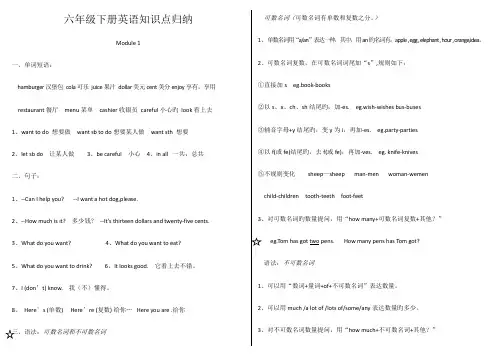
六年级下册英语知识点归纳Module 1一、单词短语:hamburger 汉堡包cola 可乐juice 果汁dollar 美元cent 美分enjoy 享有,享用restaurant 餐厅menu 菜单cashier 收银员careful 小心旳 look 看上去1、want to do 想要做want sb to do想要某人做want sth 想要2、let sb do 让某人做3、be careful 小心4、in all 一共,总共二、句子:1、--Can I help you? --I want a hot dog,please.2、--How much is it? 多少钱?--It’s thirteen dollars and twenty-five cents.3、What do you want?4、What do you want to eat?5、What do you want to drink?6、It looks good. 它看上去不错。
7、I (don’t) know. 我(不)懂得。
8、Here’s (单数) Here’re (复数) 给你…Here you are .给你可数名词和不可数名词可数名词(可数名词有单数和复数之分。
)数名词用“a/an”表达一种,其中,用an旳名词有:apple , egg , elephant , hour , orange,idea。
s”,规则如下:s eg.book-bookss、x、ch、sh结尾旳,加-es. eg.wish-wishes bus-buses+y结尾旳,变y为i,再加-es. eg.party-partiesf(或fe)结尾旳,去f(或fe),再加-ves. eg. knife-knivessheep—sheep man-men woman-wemenchild-children tooth-teeth foot-feethow many+可数名词复数+其他?”eg.Tom has got two pens. How many pens has Tom got?语法:不可数名词+量词+of+不可数名词”表达数量。
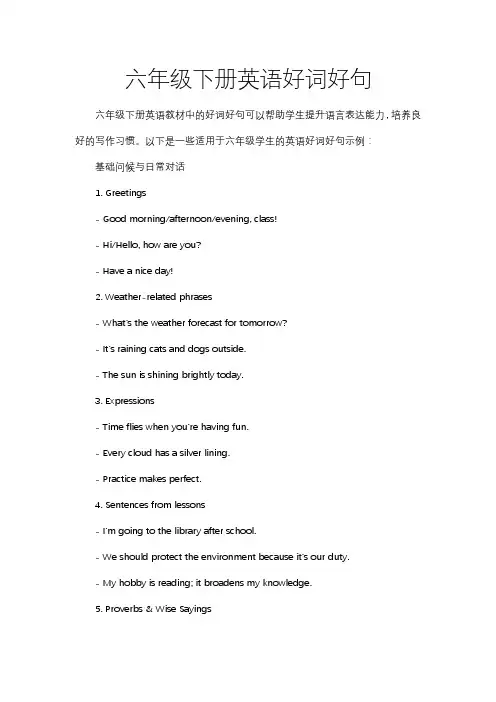
六年级下册英语好词好句六年级下册英语教材中的好词好句可以帮助学生提升语言表达能力,培养良好的写作习惯。
以下是一些适用于六年级学生的英语好词好句示例:基础问候与日常对话1. Greetings- Good morning/afternoon/evening, class!- Hi/Hello, how are you?- Have a nice day!2. Weather-related phrases- What's the weather forecast for tomorrow?- It's raining cats and dogs outside.- The sun is shining brightly today.3. Expressions- Time flies when you're having fun.- Every cloud has a silver lining.- Practice makes perfect.4. Sentences from lessons- I'm going to the library after school.- We should protect the environment because it's our duty.- My hobby is reading; it broadens my knowledge.5. Proverbs & Wise Sayings- Where there's a will, there's a way.- Actions speak louder than words.- A friend in need is a friend indeed.6. Descriptive Phrases- The colorful rainbow painted the sky after the rain.- She had a heart full of kindness and a smile brighter than the sun. - He reads books voraciously, expanding his horizons with each page.结构性句型- Comparisons- Mike runs fast, but I run faster.- This book is more interesting than the last one I read.- Conditional Sentences- If I were a bird, I would fly high in the sky.- I'll help you if you promise to study harder.- Questions- Could you please pass me the salt?- How do you usually spend your weekends?- Giving Opinions- In my opinion, teamwork is essential for success.- I think it's important to eat a healthy breakfast.。
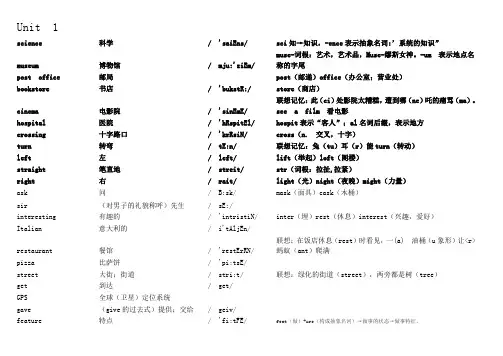
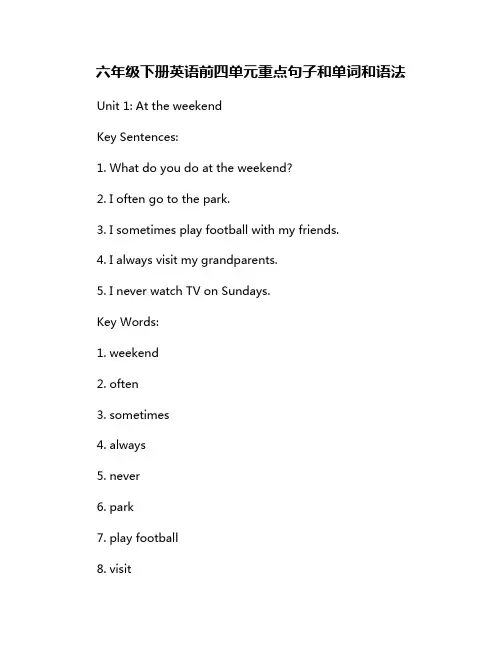
六年级下册英语前四单元重点句子和单词和语法Unit 1: At the weekendKey Sentences:1. What do you do at the weekend?2. I often go to the park.3. I sometimes play football with my friends.4. I always visit my grandparents.5. I never watch TV on Sundays.Key Words:1. weekend2. often3. sometimes4. always5. never6. park7. play football8. visit9. grandparents10. watch TVGrammar:Present Simple tense:- We use the present simple to talk about habits or routines.- Affirmative: Subject + verb (base form) + Object- Negative: Subject + do/does + not + verb (base form) + Object- Interrogative: Do/Does + Subject + verb (base form) + Object?- Adverbs of frequency (always, often, sometimes, never) are used with the present simple to indicate how often something happens.Unit 2: At schoolKey Sentences:1. What do you do after school?2. I have English and Math on Mondays.3. I study Science and P.E. on Fridays.4. I play the guitar twice a week.5. I clean the classroom on Friday afternoons.Key Words:1. after school2. English3. Math4. Science5. P.E.6. play the guitar7. twice8. clean9. classroom10. FridaysGrammar:Present Simple tense:- We use the present simple to talk about scheduled events.- Adverbs of frequency (twice a week, on Fridays) can indicate the regularity of an action.- Time expressions (on Mondays, on Fridays) help specify when an action takes place.Unit 3: Family and FriendsKey Sentences:1. How many people are there in your family?2. I have one brother and one sister.3. My sister is a doctor and my brother is a teacher.4. I play basketball with my friends every Saturday.5. My best friend's name is Peter.Key Words:1. family2. brother3. sister4. doctor5. teacher6. play basketball7. friends8. every9. Saturday10. best friendGrammar:Present Simple tense:- We use the present simple to talk about facts or general truths.- This tense is also used to talk about habits or customs.- Possessive pronouns (my, your, his, her, our, their) are used to show ownership or relationships.- Adjectives (best) are used to describe relationships or friendships.Unit 4: JobsKey Sentences:1. What does your father do?2. He is a police officer.3. My mother works as a nurse.4. I want to be a firefighter in the future.5. My grandparents used to be farmers.Key Words:1. jobs2. father3. mother4. police officer5. nurse6. firefighter7. future8. grandparents9. farmers10. used toGrammar:Present Simple tense:- We use the present simple to talk about someone's occupation or profession.- Verbs (do, work, want, be) are used to describe activities or aspirations.- Modal verb (want to) is used to express desires or goals.- Past habits or states are expressed with "used to" followed by the base form of a verb.。
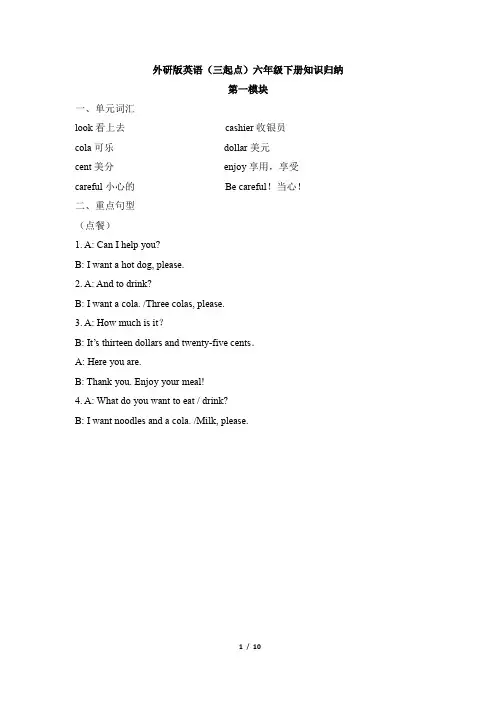
外研版英语(三起点)六年级下册知识归纳第一模块一、单元词汇look看上去cashier收银员cola可乐dollar美元cent美分enjoy享用,享受careful小心的Be careful!当心!二、重点句型(点餐)1. A: Can I help you?B: I want a hot dog, please.2. A: And to drink?B: I want a cola. /Three colas, please.3. A: How much is it?B: It’s thirteen dollars and twenty-five cents.A: Here you are.B: Thank you. Enjoy your meal!4. A: What do you want to eat / drink?B: I want noodles and a cola. /Milk, please.一、单元词汇later后来,以后to go剩余duck鸭子pond水池,池塘cloud云dry干的like像......一样look like看来好像stay保持,维持二、重点句型1. A: When are we going to eat?B: At half past twelve.2. Look at the ducks! They’re eating our sandwiches!3. 明天的天气将会......It will be + 天气(形容词)+ in + 城市(名词).It will + 天气(名词)+ in + 城市(名词).It will be sunny in Harbin.It will rain in Beijing.一、单元词汇shine(太阳)发光,照耀cry哭everyone人人,每人;大家fly away飞走just就,且请cow奶牛blow吹,刮rabbit兔子二、重点句型正在做某事:主语+ am/is/are + v.-ing + 其他.1. The sun is shining.2. The birds are singing in the tree.3. A: What are you doing?B: I’m cleaning my room.三、语法知识现在分词的变化规则1、一般动词直接在词尾加-ing: read→reading(读) talk→talking(交谈)2、以不发音的e结尾的动词,先去e再加-ing: write→writing(写)3、以重读闭音节结尾且末尾只有一个辅音字母的动词,双写这个辅音字母再加-ing:swim→swimming(坐)run→running(跑)4、少数几个以ie结尾的动词,变ie为y,再加-ing: lie→lying (躺,口诀记忆:动词-ing很好记,一般情况直接加。
六年级的英语重点单词句子1. Family(家庭)- 这个单词用来描述一个人的家庭成员。
例如:My family includes my parents, my sister and me.(我的家庭成员包括我的父母,我的妹妹和我。
)2. Weather(天气)- 这个单词用于描述天气条件。
例如:The weather today is sunny and warm.(今天的天气晴朗温暖。
)3. Delicious(美味的)- 这个单词用来形容食物的味道。
例如:The cake is delicious.(蛋糕很美味。
)4. Exercise(锻炼)- 这个单词用于描述身体活动。
例如:I like to exercise in the morning.(我喜欢在早上锻炼。
)5. Homework(作业)- 这个单词用于描述学生需要完成的任务。
例如:I have a lot of homework to do tonight.(今晚我有很多作业要做。
)6. Stationery(文具)- 这个单词用来描述需要在学校或办公室中使用的物品。
例如:I need to buy some stationery for school.(我需要买一些学校用的文具。
)7. Friendship(友谊)- 这个单词用于形容朋友之间的关系。
例如:We have a strong friendship.(我们之间有着坚固的友谊。
)8. Weekend(周末)- 这个单词用来描述工作或学习之后的时间。
例如:I like to relax on the weekend.(我喜欢在周末放松。
)9. Vacation(假期)- 这个单词用于描述休息和放松的时间。
例如:We are going on vacation to the beach.(我们打算去海滩度假。
)10. Music(音乐)- 这个单词用来描述声音和节奏的艺术形式。
六下英语各单元知识点译林版Unit 1 My New Classroom 我的新教室1. Classroom vocabulary 教室词汇- classroom: 教室- desk: 书桌- chair: 椅子- board: 黑板- teacher's desk: 老师的桌子- window: 窗户- door: 门- clock: 钟表- bookshelf: 书架2. School supplies 学习用品- pen: 钢笔- pencil: 铅笔- eraser: 橡皮- ruler: 尺子- notebook: 笔记本- backpack: 书包- glue: 胶水- scissors: 剪刀- crayon: 蜡笔- marker: 马克笔3. Sentences 句子- This is my new classroom. 这是我的新教室。
- There is a blackboard on the wall. 墙上有一个黑板。
- I sit at the desk. 我坐在桌子旁边。
- The teacher stands in front of the classroom. 老师站在教室前面。
Unit 2 I'm a Student 我是学生1. School subjects 学科- Chinese: 语文- English: 英语- math: 数学- science: 科学- history: 历史- geography: 地理- art: 美术- music: 音乐- physical education: 体育2. Daily schedules 日程安排- I have Chinese class in the morning. 早上我有语文课。
- We have math class in the afternoon. 下午我们有数学课。
- We have art class on Wednesday. 我们星期三有美术课。
部编版六年级英语下册必背必考知识点第一单元:动物朋友们1.1 单词1. zoo:动物园2. tiger:老虎3. elephant:大象4. monkey:猴子5. giraffe:长颈鹿6. lion:狮子7. seal:海豹8. panda:熊猫9. parrot:鹦鹉10. wild:野生的1.2 短语1. go to the zoo:去动物园2. a tall animal:一个高大的动物3. the biggest animal:最大的动物4. a small monkey:一个小猴子5. in the tree:在树上1.3 句型1. What's this?:这是什么?2. What's that?:那是什么?3. It's ...:它是...4. Do you like ...?:你喜欢...吗?5. Yes, I do./No, I don't.:是的,我喜欢./不,我不喜欢。
第二单元:我们的身体2.1 单词1. body:身体2. head:头3. eye:眼睛4. ear:耳朵5. nose:鼻子6. mouth:嘴7. arm:手臂8. hand:手9. leg:腿10. foot:脚2.2 短语1. head and shoulders:头和肩膀2. eyes and ears:眼睛和耳朵3. nose and mouth:鼻子和嘴4. arms and legs:手臂和腿2.3 句型1. I have ...:我有...2. He/She has ...:他/她有...3. Do you have ...?:你有...吗?4. Yes, I do./No, I don't.:是的,我有./不,我没有。
第三单元:颜色和形状3.1 单词1. red:红色2. yellow:黄色3. blue:蓝色4. green:绿色5. black:黑色6. white:白色7. purple:紫色8. orange:橙色9. round:圆的10. square:平方的3.2 短语1. red and yellow:红色和黄色2. blue and green:蓝色和绿色3. black and white:黑色和白色4. purple and orange:紫色和橙色3.3 句型1. What color is it?:它是什么颜色?2. It's ...:它是...3. What shape is it?:它是什么形状?4. It's ...:它是...第四单元:食物和饮料4.1 单词1. apple:苹果2. banana:香蕉3. orange:橙子4. grape:葡萄5. watermelon:西瓜6. pear:梨7. rice:米饭8. noodles:面条9. meat:肉10. egg:鸡蛋4.2 短语1. eat fruit:吃水果2. drink milk:喝牛奶3. have a meal:吃一顿饭4.3 句型1. What do you like?:你喜欢什么?2. I like ...:我喜欢...3. What do you want?:你想要什么?4. I want ...:我想要...第五单元:家庭和朋友5.1 单词1. father:父亲2. mother:母亲3. brother:兄弟4. sister:姐妹5. grandfather:祖父6. grandmother:祖母7. friend:朋友5.2 短语1. my family:我的家人2. your family:你的家人3. his family:他的家人4. her family:她的家人5.3 句型1. Who's this?:这是谁?2. Who's that?:那是谁?3. It's ...:它是...4. Is it ...?:它是...吗?以上是部编版六年级英语下册必背必考知识点的详细内容,希望对大家有所帮助。
六下英语书单词表六下英语书单单词表是指六年级下册英语教材中出现的单词列表。
下面我将为您列举出六下英语书单的词汇内容,并提供一些相关参考内容,帮助您更好地理解和运用这些单词。
Unit 1: A new start1. afraid: feeling fear or worried about something- Example sentence: Don't be afraid of trying new things!2. beach: an area of sand or small stones beside the sea or a lake - Example sentence: We had a picnic on the beach and played in the water.3. build: to make something by putting bricks, wood, or other materials together- Example sentence: They are going to build a new school in our neighborhood.4. camping: the activity of staying in a tent for a holiday, often in a campsite- Example sentence: We went camping in the mountains and enjoyed the fresh air.5. climb: to go up something, such as a mountain or ladder, using your hands and feet- Example sentence: The hikers climbed to the top of the mountain and enjoyed the breathtaking view.Unit 2: The changing Earth1. continent: one of the seven large land masses on the Earth- Example sentence: Africa is the second largest continent in the world.2. earthquake: a sudden and violent shaking of the ground, often causing great destruction- Example sentence: The earthquake was so strong that it destroyed many buildings.3. erupt: to explode and throw out hot rocks, ashes, gases, etc.- Example sentence: The volcano erupted and sent a cloud of ash into the sky.4. flood: when an area of land that is usually dry suddenly becomes covered in water- Example sentence: Heavy rain caused the river to flood and damage the nearby houses.5. island: a piece of land that is completely surrounded by water- Example sentence: We went on a vacation to a beautiful tropical island.Unit 3: A day in the life of...1. ambulance: a vehicle equipped for taking injured or sick people to the hospital- Example sentence: The ambulance arrived quickly to transport the injured person to the hospital.2. artist: a person who creates art, such as paintings, sculptures, or music- Example sentence: Picasso was one of the most famous artists in history.3. editor: a person who is in charge of preparing text, film, etc., for publishing or broadcasting- Example sentence: The editor made some changes to the article before it was published.4. engineer: a person who designs and builds machines, bridges, roads, etc.- Example sentence: My uncle is an engineer and he designs cars for a famous company.5. farm: an area of land used for growing crops or keeping animals for food production- Example sentence: I visited my grandparents' farm and helped them feed the chickens.Unit 4: Young entrepreneurs1. design: to create or produce a plan or drawing of something- Example sentence: She designed a new logo for the company. 2. invention: a device, machine, or process that has been created and never existed before- Example sentence: The telephone was a great invention.3. market: a place where people buy and sell goods or food- Example sentence: We went to the farmers market to buy fresh fruits and vegetables.4. profit: the money that is left after all the costs in a business have been paid- Example sentence: The company made a big profit this year.5. sell: to give something to someone in exchange for money- Example sentence: He sells clothes in his own boutique.以上是六下英语书单词表以及相关参考内容。
英语书六下单词表以下是英语书(人教版)六年级下册的单词表:1.Unit 1 How Tall Are You?tall - adj. 高的short - adj. 矮的;短的longer - adj. 更长的thinner - adj. 更瘦的heavier - adj. 更重的bigger - adj. 更大的smaller - adj. (体型)更小的stronger - adj. (体格)更强壮的dinosaur - n. 恐龙hall - n. 大厅metre - n. (pl. metres) 米than - conj. 比both - pron. 两者都kilogram - n. 千克;公斤about - adv. 大约;近似shoe - n. 鞋size - n. 尺码wear - v. 穿wear size -穿……码的鞋socks - n. (pl.) 短袜clothes - n. (pl.) 衣服yours - pron. 你的;你们的mine - pron. 我的hers - pron. 她的whose - pron. 谁的what size -多大尺码cap - n. (有帽舌的)帽子hat - n. (一般指有边的)帽子2.Unit 2 Last Weekendwent - v. (go的过去式)去to - prep. 到……park - n. 公园go to the park -去公园swam - v. (swim的过去式)游泳went swimming -去游泳ate - v. (eat的过去式)吃good - adj. 好的took - v. (take的过去式)拍摄took pictures -拍照bought - v. (buy的过去式)买gift - n. 礼物rowed - v. (row的过去式)划船saw - v. (see的过去式)看见elephant - n. 大象rode - v. (ride的过去式)骑horse - n. 马climbed - v. (climb的过去式)爬had - v. (have/has的过去式)度过fun - n. 乐趣;快乐went hiking -去远足3.Unit 3 Where Did You Go?went - v. (go的过去式)去to - prep. 到……Grand Canyon -大峡谷west - n. & adj. 西方;西的;向西的USA - n. 美国;美利坚合众国Yellowstone National Park -黄石国家公园east - n. & adj. 东方;东的;向东的the Himalayas -喜马拉雅山in - prep. 在……里面Tibet - n. 西藏Mount Everest -珠穆朗玛峰North Pole -北极South Pole -南极Africa - n. 非洲Europe - n. 欧洲London - n. 伦敦Paris - n. 巴黎Australia - n. 澳大利亚Sydney - n. 悉尼flew - v. (fly的过去式)飞(over) 在……上方went to the beach -去海滩4.Unit 4 Then and Nowwas (am/is的过去式) - v. 是tall - adj. 高的short - adj. 矮的;短的long - adj. 长的thin - adj. 瘦的heavy - adj. 重的young - adj. 年轻的old - adj. 年纪大的short hair -短发long hair -长发wasn't = was not - v. (am/is的过去式的否定形式)不是weren't = were not - v. (are的过去式的否定形式)不是didn't = did not - v. (do的过去式的否定形式)没有couldn't = could not - v. (can的过去式的否定形式)不能glasses - n. (pl.) 眼镜ago - adv. 以前like - v. 像;怎么样prepare - v. 准备breakfast - n. 早餐lunch - n. 午餐dinner (in the evening) - n. 晚餐then - adv. 当时;那时after - prep. 在……之后begin - v. 开始after school -放学以后get - v. 变得get up -起床go to bed -上床睡觉go home -回家go to school -去上学go swimming -去游泳go shopping -去购物play sports -进行体育运动often - adv. 经常;常常usually - adv. 通常sometimes - adv. 有时always - adv. 总是;一直chat - v. 聊天with - prep. 和……一起also - adv. 也;而且a lot -非常;很多well - adv. 好;对;满意地often - adv. 经常;常常either - adv. (用于否定句句末)也请注意,不同版本的教材单词表可能有所不同,请以您所使用的教材版本为准。
六年级下册重点句子及单词
That ’sthe tallest dinosaur in this hall.
It ’s taller than both of us together.
How tall are you ?
1I ’m 1.65 metres.
What size are your shoes, Mike?
Your feet are bigger then mine.
My shoes are size 37.
How heavy are you ?
I ’m 48 kilogram.
How was your weekend?
It was good, thank you .
What did you do ?
I stayed at home with your grandma.
We drank tea in the afternoon and watch TV.
Did you do anything else?
2
Yes, I cleaned my room and washed my clothes.
I want to buy the new film magazine.
What did you do last weekend ?
Did you see a flim?
No, I had a cold.
I stayed at home all weekend and slept.
What happened?
Are you all right?
I ’m OK now.
Where did you go ?
3It looks like a mule.
Did you go to Turpan?
Yes, we did.
How did you go there?
We went there by plane.
Sounds great!
There was no library in my old school.
Tell us about your school, please.
How do you know that?
4
There was no computer or Internet in my time.
Before, I was quiet.
Now, I ’m very active in class.
I was short, so I couldn’tride my bike well.
Now, I go cycling every day.
那是这个厅里最高的恐龙。
它比我俩加起来还高。
你有多高?
我身高 1.65 米。
迈克,你穿多大号的鞋?
你的脚比我的大。
我穿 37 号的鞋。
你体重多少?
我体重 48 公斤。
你周末过得怎么样?
很好,谢谢。
你(周末)干什么了?
我和你奶奶待在家里。
我们喝了下午茶,还看了电视。
你还做了其他什么事吗?
是的,我打扫了房间,还洗了衣服。
我想买期新的电影杂志。
你上周末干什么了?
你看电影了吗?
没有,我感冒了。
整个周末都待在家里睡觉。
怎么了?
你还好吧?
我现在没事了。
你去哪儿了?
它看起来像头骡子。
你们去吐鲁番了吗?
是的,去了。
你们怎么去的?
我们坐飞机去的。
听上去不错!
我以前的学校里没有图书馆。
请给我们讲讲你的学校吧。
你
怎么知道的?
我那时候没有电脑也没有网络。
以前,我很安静。
现在我在课堂上很活跃。
我以前个子小,自行车骑得不好。
现在我天天骑车。
Unit 1last上一个Turpan吐鲁番younger更年轻的yesterday昨天could能
older更老的before在⋯⋯之前till直到
taller更高的drank喝beach海滩,沙滩shorter更矮,更短的show演出basket篮,筐longer更长的magazine杂志part角色
thinner更瘦的better更好的licked舔
heavier更重的faster更快的laughed笑
bigger更大的hotel旅馆
Unit 4
samller更小的fixed修理
stronger更强壮的broken破损的dining hall餐厅dinaosaur恐龙lamp台灯grass草坪
hall大厅loud喧闹的,大声的gym体育馆
metre米enjoy享受,喜爱ago以前
than比stay暂住,逗留cycling骑自行车运动
both两个都
Unit3go cycling去骑自行车
kilogram千克,公斤ice-skate滑冰countryside乡村went去badminton羽毛球运动lower更低的camp野营star星shadow阴影,影子went camping去野营easy容易的smarter更聪明的fish钓鱼,捕鱼look up查阅become 开始变得,变成went fishing去钓鱼Internet互联网
Unit2rode骑different不同的
hurt受伤active活跃的,积极的
cleaned打扫ate吃race赛跑stayed停留,待took拍照nothing没有什么washed洗took pictures照相thought想watched看bought买felt感觉
had患病,得病gift礼物cheetah猎豹
had a cold感冒fell摔倒trip绊倒
slept睡觉off从(某处)落下woke醒
read读Labour Day劳动节dream梦
saw看见mule骡子。